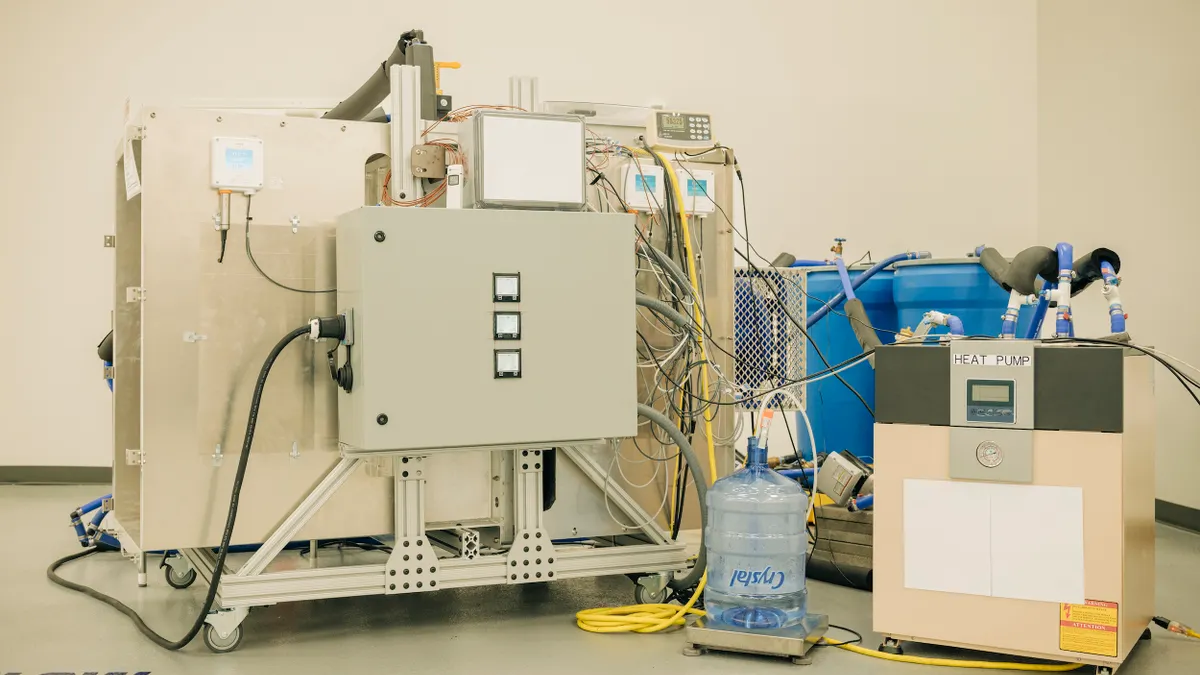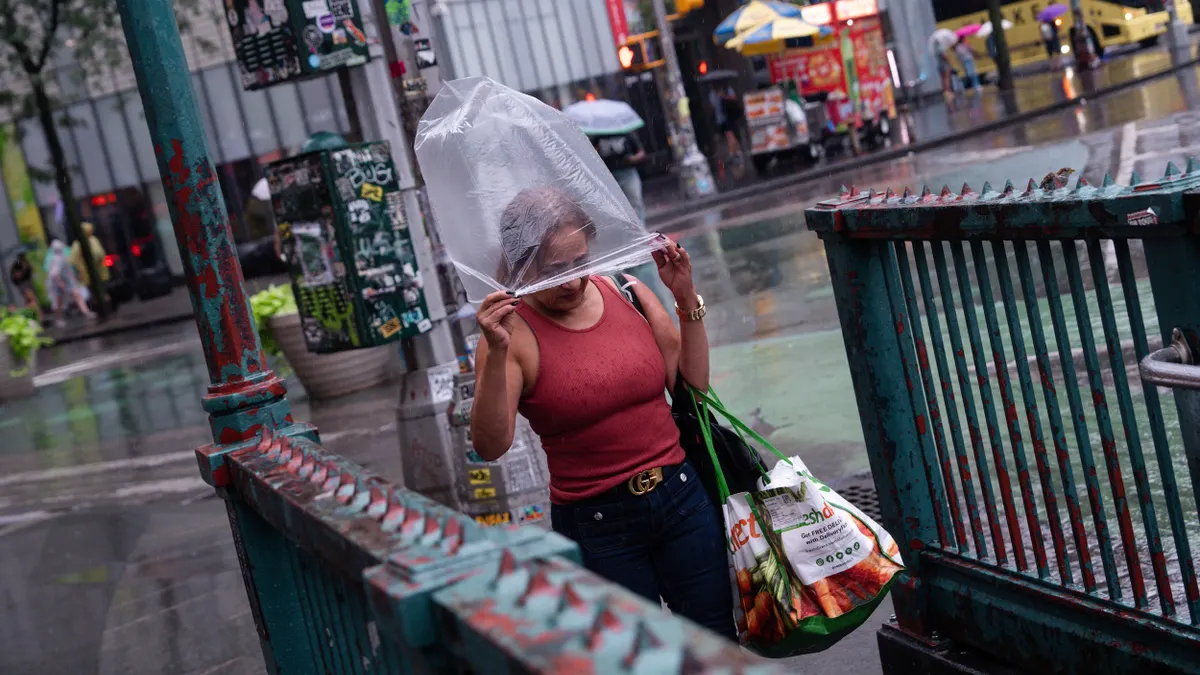Since 1965, Walt Disney World Resort in Orlando, FL has been known as the "Happiest Place on Earth" — a nomenclature that quickly turned ironic this April when 70,000 of its workers were furloughed.
A few miles up the road from Disney sit the temporarily shuttered Universal Studios theme parks, of which 27,000 employees are now furloughed or receiving reduced pay. Nearby SeaWorld Orlando faced a similar fate. For a region that runs on hospitality and entertainment, these layoffs, forced by the COVID-19 pandemic, could spark an entirely new workforce development strategy in Orlando.
The national unemployment rate of the leisure and hospitality "supersector" reached nearly 40% in April, according to the U.S. Bureau of Labor Statistics. As some of these workers explore opportunities in new industries, the resurgence of beloved — and money-making — hospitality attractions and amenities remains unknown.
Organizations in Orlando and other U.S. cities have tried to tackle this challenge through virtual hiring events and opportunities, while researchers study economic shifts amid the pandemic, all to place residents back on their feet and readjust the capabilities of future workforces.
Tapping into virtual hiring
As U.S. unemployment climbs to an expected 17% by June, cities and businesses are turning to virtual career fairs and networking opportunities to assist in recovery. Career Fair Connection is one company hosting free virtual hiring events nationwide for cities including Chicago, Salt Lake City and Cleveland, while some employers look to more local opportunities.
In an effort to assist the unemployed, particularly from Central Florida’s $75 billion tourism industry, OrlandoJobs.com has run a free virtual job fair since March 27. Nearly 1,700 Central Florida jobs have been posted through the Hire Day Orlando effort, with companies ranging from behemoths like Amazon to local entities like University of Florida Health. The City of Orlando even has a booth on the site, with 21 available job listings as of May 13.
Orlando saw 75 million visitors last year, and nearly everyone who supports those visitors is out of work today, OrlandoJobs.com President Roger Lear told Smart Cities Dive. "Once everything starts coming back, it’ll be interesting to see if a Disney employee who went to Amazon, if they’ll go back to Disney," he said.
Unemployment surged to 14.7% in April as the US lost a record 20.5 million jobs. Hang in there, friends. We know this number is higher right now in Orlando but hopefully, this will be the peak. Employers do have jobs. See them here: https://t.co/PsBYTkKlvQ #jobs #orlando
— OrlandoJobs.com (@OrlandoJobs) May 8, 2020
The virtual hiring event has been "an amazing way to connect with some employers we would have never known about," Lear said, adding that he thinks companies will be "much more open" to this trend of virtual hiring moving forward.
Similar success has been seen with the Central Ohio ReEmployment & Resource Virtual Hiring Event (CORRE), co-hosted by the Workforce Development Board of Central Ohio (WDBCO). Every week from 8:00 a.m. on Thursday through 11:59 p.m. on Sunday, registered companies and job seekers have free access to network in a virtual "convention center."
Registered companies are given a customizable "booth" while job seekers have access to upload resumes and information for companies. As job seekers navigate the event, they can click on booths to learn more information or speak with representatives at any time over the weekend. If companies are offline, they can post times that they’ll be back to connect with potential employees.
The final CORRE event is scheduled for May 28-30, but CORRE may be extended through June and July, if there’s enough demand, WDBCO President and CEO Lisa Patt-McDaniel told Smart Cities Dive. Even beyond the pandemic, CORRE may remain a long-term resource for Central Ohio residents.
"If we’re going to continue to use this, I don’t see why we would ever rent a major space ever again," Patt-McDaniel said.
Some companies have made virtual hiring the focus of their business models. Charleston, SC-based talent platform Tallo is one such company that has worked since 2012 to get students interested in emerging industries.
Despite its existing footprint in virtual hiring, Tallo saw record-setting traffic in March, which was beat by over 40% in the month of April, according to CEO Casey Welch. This traffic has come not only from workers who were laid off in various markets, but also from high school and college students struggling to advance their education.
"All the ways they normally connected with colleges or companies just got pulled away from them. There’s no more career fairs, no more going to visit the colleges," Welch said of students amid the pandemic, noting Tallo has been a resource for continued recruitment efforts.
Reimagining the talent pool
As cities leverage opportunities for virtual workforce development, some challenges swirl around connecting employers with the appropriate job seekers.
"That’s probably one of our first learnings" said Patt-McDaniel. She explained that CORRE organizers "noticed right away there were some mismatches" in the participating companies and the types of job seekers coming in, and worked harder to market the event to more types of job seekers, including entry-level applicants. She also said data collection conducted during registration has been helpful in understanding the attendee pool to better match employers with job seekers.
However, simply using data to match companies with candidates is not enough, Patt-McDaniel said. "At some point there needs to be some kind of face-to-face, even if it’s not in person."
Lear of OrlandoJobs.com said the onset of virtual hiring will help users adjust to tools and capabilities that they were "very hesitant to use" before COVID-19, like video interviews. "Virtual interviews were completely intimidating for job seekers” prior to the pandemic, he said, as they were typically canned interviews that were not prioritized with a one-on-one interview.
Beyond adjusting to new digital priorities, companies are also learning to adjust to new candidate pools. The Orlando Economic Partnership launched a series of initiatives and programming, called Upskill Orlando, that’s designed to encourage employers to "think differently about the people that could fit their mold," Danielle Permenter, senior director of regional talent initiatives at the Partnership, told Smart Cities Dive.
The Partnership is encouraging its area employers to use a strategy called "skills-based hiring" when considering candidates, especially amid the pandemic. The process requires employers to evaluate an individual "on their proficiencies and their capabilities, before evaluating their education and their background experience," Permenter said.
This practice can assist companies in connecting with employees from outside their own industries or from industries not available in the region of the employer — which may be crucial amid economic and employment hurdles.
Embracing emerging tech
The benefits of skills-based hiring practices can carry on beyond the pandemic as technology advances and alters the shape of the future workforce.
"We’ve started to see that NAICS Codes [Northern American Industry Classification System Codes used in traditional hiring practices] really aren’t a true indication of the type of work being done from industry to industry or from person to person," said Phoebe Fleming, director of research at the Orlando Economic Partnership.
Fleming used Orlando’s competitive advantage in customer service as an example. "We really do have a huge advantage in those skills. How do you combine those with more technical skills to have a workforce that still serves people from a customer service standpoint, but looks different because ... you’re doing it over an automated or electric system?" she asked.
"You need to have a virtual solution as part of your strategy going forward."

Casey Welch
President and CEO, Tallo
Outside of hiring, this pandemic has shifted how many Americans perceive the traditional work day.
"We became so reliant on the in-person meeting. It can all be taken away within a matter of days. You need to have a virtual solution as part of your strategy going forward," said Welch of Tallo. "This brought us all aware of something that nobody ever planned for. Just like when 9/11 happened. It changed the way certain things happen."
For the City of Las Vegas, a virtual solution has long been a part of its strategy. The city was "pretty ready" to shift staff to remote work, Michael Sherwood, director of the city’s Information Technologies Department, told Smart Cities Dive.
Sherwood advised that cities struggling to adjust to a remote workforce start small and use off-the-shelf products to better connect staff, residents and businesses. "The cloud is your friend," he said. "Embrace some of this newer technology that might’ve had resistance in the past and start learning how to leverage it."
And for the cities facing an economic shift as unemployed residents explore new industries, embracing technology is more crucial than ever in staying ahead of the curve.
"I think we do know pretty clearly that more use of technology and automation is going to come even faster than we expected," Patt-McDaniel said. “The ability for any region to be resilient and respond quicker than they expected [using technology], those are going to be the winners."
To keep up with all of our coverage on how the new coronavirus is impacting U.S. cities, visit our daily tracker.


















